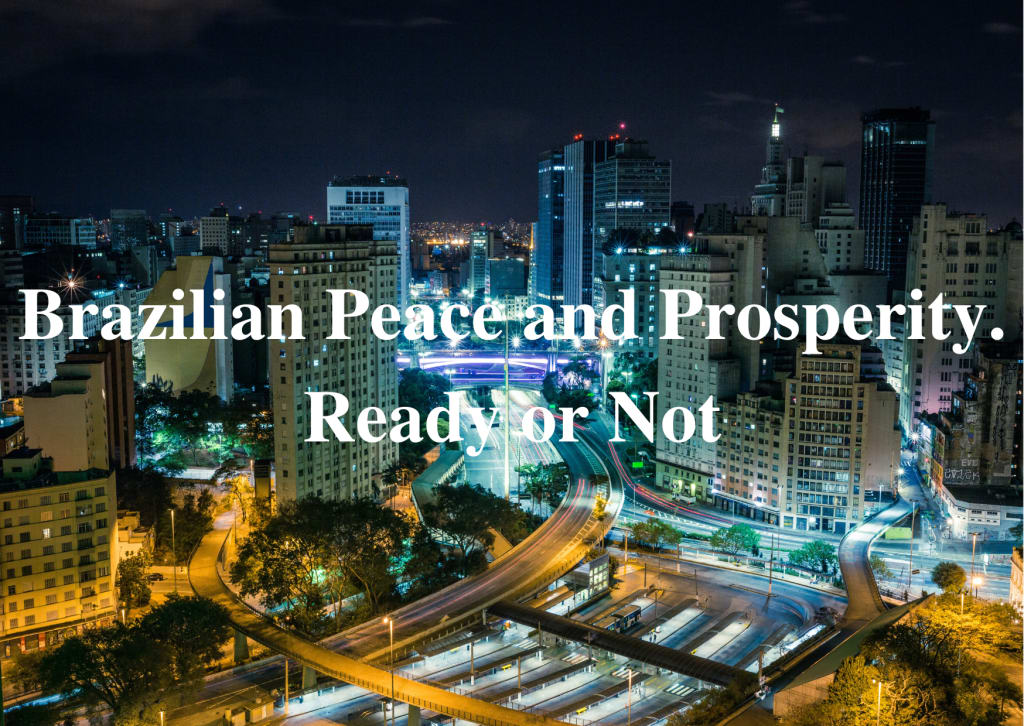Brazilian Peace and Prosperity. Ready or Not
What the recent election can mean to Brazil.

Bolsonaro is a right-wing Brazilian politician who has been vocal about his desire to destroy democracy. He has expressed support for dictatorship and has said that he would "eradicate totally" the country's political system if he ever became president again. If re-elected, Bolsonaro would be the first president in Brazil's history with no prior political experience. His policies, if enacted, would have serious consequences for the country's citizens, who have been fighting for democracy for over 30 years.
Anti-democracy fascism is contagious. It is a brutal ideology that seeks to break down the institutions that are essential to freedom and democracy, while creating the conditions for a totalitarian state.
We have already seen how easily the U.S. could become a fascist dictatorship.
The article, "10 Ways The United States Is Moving Toward A Fascist Police State," describes a list of things that are becoming increasingly common in America.
This list includes a corrupt government, the absence of jobs, a government that wages illegal wars, government agencies spying on its citizens, rampant political corruption, the police killing unarmed citizens, the militarization of police, invasive surveillance of citizens, the destruction of the freedom of speech, poverty and the rise of the wealthy class, and the use of terror against its own citizens.
Bolsonaro has already made it clear how he wants to abolish democracy.
He only needs to follow the steps laid out by the U.S. and the rise of fascism will be complete. Under Bolsonaro Brazil, like America, has checked each of the boxes.
Background on Bolsonaro and his political views
Jair Bolsonaro is the former president of Brazil. First elected to the office on January 1st, 2019. His political views are largely considered to be controversial due to his racist, homophobic, misogynistic rhetoric. Bolsonaro was also known for being a former military officer who supported the military dictatorship in Brazil from 1964-1985.
He also believed in the use of torture and the death penalty to deter crime and punishment. Bolsonaro also had a strong anti-communist sentiment, as well as being anti-immigration and being anti-democracy.
Legally, Brazil's political system has some formal structures, but de facto it is highly corrupt. The country has had 21 presidents since the end of World War II. Many of these presidents were either corrupt and or murdered by military or paramilitary coups, or were removed from office by impeachment or by a popular referendum.
Bolsonaro believes he had a strong appeal to the military of Brazil and is a firm believer in the establishment of a military dictatorship. Jair Bolsonaro has also been quoted as saying "to deal with corruption one must act in the same manner as the Mafia or the drug traffickers and dealers, and that is, kill for free and with impunity."
Bolsonaro's political ascendance has only been possible because the left wing of Brazil has been weakened by the years of corruption from the Workers Party and the United Socialist Party of Brazil.
Brazil's history is one of violence and corruption, it has never been a nation of stability and has been plagued by poverty and disease for most of its history. However, over the past few decades something remarkable has happened: Brazil has begun to change. The country is now on the brink of becoming a powerful global economic powerhouse, thanks in large part to its booming economy and burgeoning industrial sector. Here are five key reasons why Brazil's future looks so bright:
1) Economic Growth: Brazilian GDP rose 6% year-on-year in 2016, making it one of the fastest growing economies in the world. This strong performance is due largely to increasing export sales (+25%), as well as an increase in investment funds inflows (+40%). Inflation remains low (around 2%) which bodes well for continued consumer spending growth.
2) Infrastructure Investment: Brasília recently completed two major megaprojects - Line 3 railway connecting São Paulo with Rio de Janeiro and Belo Horizonte metro - which will vastly improve transportation within Brazils largest cities. Additionally, numerous other infrastructure projects are underway or planned such as new airports (Belém/Boavista), ports (Lisbon), highways (Rio Grande do Sul), power plants (Brunswick e Angra3). Combined these projects will invest more than $260 billion over the next 5 years creating thousands of jobs across all sectors
Jerry Nelson is an American writer living the expat life in Buenos Aires. Some of the adventures Jerry has enjoyed, he jumped into the ocean from the flight deck of an aircraft carrier in the Gulf of Aden, cut off a goat's balls as part of a mating ritual in Indonesia, raced a NASCAR around the oval in Charlotte, created a small coin purse out of live Tarantulas in Australia's outback, spent six-weeks with the Sinaloa cartel along the U.S./Mexican border and sailed a 16th century schooner through the sound and into the open ocean.
Never far from his coffee and Marlboros, Jerry is always glad to discuss future working opportunities. Email him at [email protected] and join the quarter-million who follow him on Twitter.
KEYWORDS: Bolsonaro, Brazil, Dictatorship, Democracy, Politics
About the Creator
Jerry Nelson
Jerry Nelson is an American writer living the expat life in Argentina and winner of the Revi 2021 Reader Award.





Comments
There are no comments for this story
Be the first to respond and start the conversation.